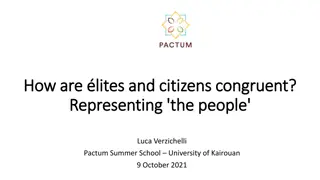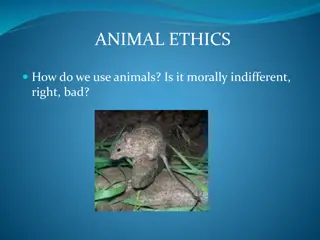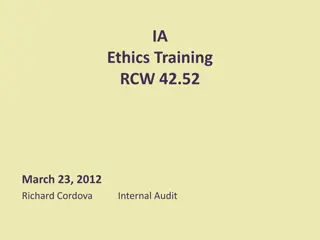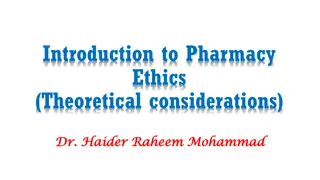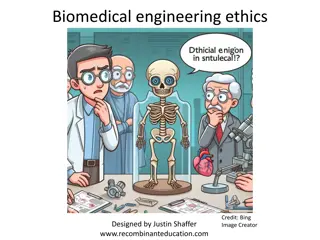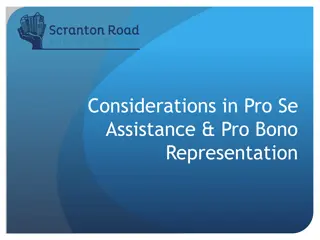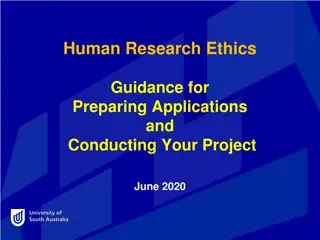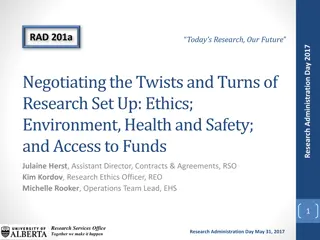Ethics Considerations in Obtaining Information During Representation
In a dissolution representation scenario, where a client provides email correspondence obtained from the adverse spouse's email without permission, using their username and password, it is unethical to use such information as it violates legal rights, involves dishonesty, and disrupts justice administration. Disclosures and actions based on wrongfully acquired information can have serious consequences, as highlighted in legal cases. Upholding ethical standards and respecting legal boundaries in acquiring evidence is crucial for lawyers.
Download Presentation

Please find below an Image/Link to download the presentation.
The content on the website is provided AS IS for your information and personal use only. It may not be sold, licensed, or shared on other websites without obtaining consent from the author. Download presentation by click this link. If you encounter any issues during the download, it is possible that the publisher has removed the file from their server.
E N D
Presentation Transcript
2020 Ethics QUIZ
A. Violates Rules 4-4.4(a) & 4- 8.4(c) if the information was inappropriately or wrongfully obtained. 1. During a dissolution representation your client sends you electronic copies of email correspondence between adverse spouse and various third persons, including adverse spouse s attorney. Your client obtained access to the information through the spouse s email account using the spouse s user name and password, which the spouse never changed. Your use of this information: B. Is permissible because the adverse spouse could have no expectation of privacy as to the information. C. Requires you to first determine whether Rule 4-1.6 permits you to reveal your client s conduct in obtaining the information. D. Is permissible because adverse spouse failed to take reasonable steps to protect it.
ANSWER: A. Violates Rules 4- 4.4(a) & 4-8.4(c) if the information was inappropriately or wrongfully obtained. 1. During a dissolution representation your client sends you electronic copies of email correspondence between adverse spouse and various third persons, including adverse spouse s attorney. Your client obtained access to the information through the spouse s email account using the spouse s user name and password, which the spouse never changed. Your use of this information: Missouri Informal Opinion 2019- 01. Rule 4-4.4, COMMENT [1] Responsibility to a client requires a lawyer to subordinate the interests of others to those of the client, but that responsibility does not imply that a lawyer may disregard the rights of third persons. It is impractical to catalogue all such rights, but they include legal restrictions on methods of obtaining evidence from third persons and unwarranted intrusions into privileged relationships, such as the client-lawyer relationship. And, In re Eisenstein, 485 S.W.3d 759 (2016). Violation of Rules: 4-4.4(a) a lawyer shall not use methods of obtaining evidence that violate the legal rights of such a person ; 4-8.4(c) engage in conduct involving dishonesty, fraud, deceit, or misrepresentation ; 4-8.4(d) conduct that is prejudicial to the administration of justice;and 4-3.4(a) unlawfully obstruct another party s access to evidence or unlawfully alter, destroy, or conceal a document or other material having potential evidentiary value . COMMENT [2] in part: Similarly, this Rule does not address the legal duties of a lawyer who receives a document or electronically stored information that the lawyer knows or reasonably should know may have been inappropriately obtained by the sending person.
ANSWER: A. Violates Rules 4- 4.4(a) & 4-8.4(c) if the information was inappropriately or wrongfully obtained. 1. During a dissolution representation your client sends you electronic copies of email correspondence between adverse spouse and various third persons, including adverse spouse s attorney. Your client obtained access to the information through the spouse s email account using the spouse s user name and password, which the spouse never changed. Your use of this information: Missouri Informal Opinion 2019- 01. And, A.J.H. v. M.A.H.S. v. Hais, et.al P.C., 364 S.W.3d 680 (Mo. E.D. 2012), $25,000 sanction overturned. Trial court found: [Lawyer] had knowledge of the content of the email, continued possession rather than deletion of the emails, intent to use the emails to hurt [adverse spouse] , and failure to discourage [Client] from sharing the emails with [adverse spouse]. . Appellate Court found: [Lawyer] consulted an ethics expert and referred client to criminal defense attorneys on the issue. [Lawyer s] use of the emails amounted to placing post-it notes on particular emails. [I]f the trial court does not make an explicit finding as to bad faith, there must at least be evidence in the record which would support such a finding. While there is no concrete definition of bad faith, it embraces something more than bad judgment or negligence. A dishonest purpose, moral obliquity, conscious wrongdoing, breach of a known duty through some ulterior motive or ill will partaking of the nature of fraud. It also embraces actual intent to mislead or deceive another.
A. Threaten to refer employee to the prosecutor unless employee drops the civil suit. 2. You represent Employer defending against a wrongful discharge claim. Employer believes the employee engaged in criminal conduct during employment and the evidence of that conduct has been destroyed while in employee s lawyer s possession. You may: B. Threaten to file a disciplinary complaint against employee s lawyer unless the client drops the civil suit. C. Neither A nor B . D. B but not A .
ANSWER: C. Neither A nor B. Missouri Informal Opinion 2019-02 2. You represent Employer defending against a wrongful discharge claim. Employer believes the employee engaged in criminal conduct during employment and the evidence of that conduct has been destroyed while in employee s lawyer s possession. You may: Answer 2: If Attorney has a duty under Rule 4-8.3 to report the conduct of Plaintiff s counsel , any offer by Attorney to forego the complaint or report would violate Rule 4-8.4(a) as an attempt by Attorney to violate the Rules of Professional Conduct or to do so through the acts of another. Answer 1:Attorney s threat to refer the employment- related conduct of Plaintiff for criminal prosecution would constitute conduct prejudicial to the administration of justice in violation of Rule 4-8.4(d) unless: 1) Attorney has actual intent to refer the matter for prosecution if the matter is not dismissed or settled (see Rule 4-4.1); 2) the conduct underlying the alleged criminal offense is related to the civil action and the use of the threat does not constitute a crime (see Rule 4-8.4(b)); 3) Attorney has a non-frivolous, good faith belief based in law and fact that the employment-related conduct of Plaintiff was unlawful (see Rule 4-3.1); and [The] threat may violate Rule 4-3.1 if Attorney lacks a well-founded basis for believing Plaintiff s counsel violated the Rules . 4) Attorney s use of the threat would not lack a substantial purpose other than to embarrass, delay, or burden the Plaintiff or another person (see Rule 4- 4.4(a)). [The]threat is likely to violate Rule 4-4.4, Respect for Rights of Third Persons, and/or Rule 4-8.4(d), which prohibits conduct prejudicial to the administration of justice, if threatening to file a disciplinary report or complaint in order to extract settlement concessions is likely to be a factor Plaintiff or Plaintiff s counsel will have to consider in the representation. Because some jurisdictions consider the use of a threat to file criminal charges to gain leverage in civil litigation to be a violation of the Rules of Professional Conduct regardless of the circumstances, Attorney should use caution if the conduct could be judged by the rules of professional conduct of another jurisdiction. See Rule 4- 8.5. [A] threat which itself constitutes criminal conduct would violate Rule 4- 8.4(b), which prohibits criminal acts that reflect adversely on a lawyer s honesty, trustworthiness, or fitness as a lawyer in other respects.
ANSWER: C. Neither A nor B. MoStat 575.020 Concealing an offense 2. You represent Employer defending against a wrongful discharge claim. Employer believes the employee engaged in criminal conduct during employment and the evidence of that conduct has been destroyed while in employee s lawyer s possession. You may: 1. A person commits the offense of concealing an offense if he or she: (1) Confers or agrees to confer any pecuniary benefit or other consideration to any person in consideration of that person s concealing of any offense, refraining from initiating or aiding in the prosecution of an offense, or withholding any evidence thereof; or (2) Accepts or agrees to accept any pecuniary benefit or other consideration in consideration of his or her concealing any offense, refraining from initiating or aiding in the prosecution of an offense, or withholding any evidence thereof. Y.W. v. National Super Markets, 876 S.W.2d 785 (Mo.App. E.D. 1994). We therefore follow Ensminger, 805 S.W.2d at 217, for its holding that a private citizen or entity may not contract away his/her right to press criminal charges against the perpetrator of a crime. 2. The offense of concealing an offense is a class A misdemeanor, unless the offense concealed a felony, in which case concealing an offense is a class E felony.
ANSWER: C. Neither A nor B. MoStat 575.030 Stealing 2. You represent Employer defending against a wrongful discharge claim. Employer believes the employee engaged in criminal conduct during employment and the evidence of that conduct has been destroyed while in employee s lawyer s possession. You may: 1. A person commits the offense of stealing if he or she: (1) Appropriates property or services of another with the purpose to deprive him or her thereof, either without his or her consent or by means of deceit or coercion; MoStat 575.010 Chapter Definitions (19) Property , anything of value, whether real or personal, tangible or intangible, in possession or in action, and shall include but not be limited to the evidence of a debt actually executed but not delivered or issued as a valid instrument; COMMENTS - The defense of justification provided in the last paragraph of (4) is meant to protect those who threaten to invoke legal action in order to obtain what they honestly believe to be due them. (4) Coercion , a threat, however communicated to inflict any other harm which would not benefit the actor. A threat of accusation, lawsuit or other invocation of official action is justified and not coercion if the property sought to be obtained by virtue of such threat was honestly claimed as restitution or indemnification for harm done in the circumstances to which the accusation, exposure, lawsuit or other official action relates, or as compensation for property or lawful service. The defendant shall have the burden of injecting the issue of justification as to any threat.
A. Shall promptly give the departing attorney the files on which she was lead attorney, but may retain the others. 3. An attorney is leaving your law firm. The departing attorney has been the lead attorney or assisted another attorney at the firm in a number of client matters. Regarding the client files you: B. Shall promptly give the departing attorney all files on which she was lead or assisting attorney. C. May retain all files in question because by contract they are firm property. D. Shall comply with client directions on where to transmit the file.
ANSWER D: Shall comply with client directions on where to transmit the file. 3. An attorney is leaving your law firm. The departing attorney has been the lead attorney or assisted another attorney at the firm in a number of client matters. Regarding the client files you: Missouri Informal Opinion 2019-03 The file for each client matter belongs to the client, except for those items in the file for which the firm has borne uncompensated out- of-pocket expenses, such as, but not limited to, transcripts. Formal Opinion 115, as amended. Even if the attorney or firm has not been paid for services rendered, a firm or lawyer must comply with a client s direction to transmit the file to the departing attorney or new counsel. A client who is notified of the departure of that client s attorney should be informed that the client file will continue to be housed at the firm until and unless the client communicates his or her wishes as to the disposition of the file. The client file should not be removed or copied by the departing attorney unless the client so directs.
ANSWER D: Shall comply with client directions on where to transmit the file. 3. An attorney is leaving your law firm. The departing attorney has been the lead attorney or assisted another attorney at the firm in a number of client matters. Regarding the client files you: Missouri Rules of Professional Conduct that may come into play: 4-1.1 Competence 4-1.3 Diligence 4-1.4 Communication 4-1.5 Fees 4.1.6 Confidentiality of Information (see particularly 4-1.6(b)(5)) 4-1.15 Safekeeping Property 4-1.16 Declining or Terminating Representation 4-1.22 File Retention 4-5.6 Restrictions on Right to Practice 4-8.3 Reporting Professional Misconduct 4-8.4 Misconduct Civilly (???) Missouri Attorney ordered to pay former firm damages of $557,292 and attorney s fees of $218,415 related to manner in which attorney left firm. Count I Violation of the Missouri Computer Tampering Act Count II Breach of Contract Count III Breach of Duty of Loyalty Count IV Breach of Fiduciary Duty
A. Shall report the threat to law enforcement. 4. You receive an email from your client in a dissolution matter, in which, in addition to describing his dissatisfaction with your representation, he states, And if I don t get what I want when this is done, she s gonna find out what Til death do you part really means . The client cc d the email to his uncle who practices law in another state. You: B. Shall report the threat to counsel for the adverse party. C. Shall report the threat to the adverse party. D. May report the threat to law enforcement if the client gives informed consent.
ANSWER D: May report the threat to law enforcement if the client gives informed consent. 4. You receive an email from your client in a dissolution matter, in which, in addition to describing his dissatisfaction with your representation, he states, And if I don t get what I want when this is done, she s gonna find out what Til death do you part really means . The client cc d the email to his uncle who practices law in another state. You: Missouri Informal Opinion 2019-05 The fact that Client has left threatening voice mail messages with Attorney is information related to the representation governed by Rule 4-1.6, Confidentiality of Information. Attorney is not permitted by Rule 4-1.6 to report the threats to law enforcement unless Client gives informed consent to the report or Attorney is revealing the information to the extent Attorney reasonably believes necessary to prevent death or substantial bodily harm reasonably certain to occur, in accordance with Rule 4-1.6(b)(1). Comment [6] Such harm is reasonably certain to occur if it will be suffered imminently or if there is a present and substantial threat that a person will suffer such harm at a later date if the lawyer fails to take action necessary to eliminate the threat.
A. Shall inform the client in writing that a portion of the fee may be due or claimed by predecessor lawyer. 5. You accept a contingent fee matter after the client discharged her first lawyer. You: B. Shall not charge client for negotiating predecessor counsel s fee if it does not increase the client s share. C. If you negotiate with predecessor counsel, shall obtain informed consent from client to any conflict from your dual roles. D. A, B & C
ANSWER: D. A, B & C. ABA Formal Opinion 487 - Fee Division with Client's Prior Counsel 5. You accept a contingent fee matter after the client discharged her first lawyer. You: Galanis v Lyons & Truitt, 715 N.E.2d 858 (Ind. 1999). Successor attorney who fails to contract away predeccesor counsel s fee is liable for that fee from her portion. Just as in any contingent fee matter, the successor counsel must comply with both Model Rule 1.5(b) in describing the rate or basis of the fee and with Model Rule 1.5(c) s requirement that the written fee agreement include the method of determining the fee. [B]oth rules are designed to ensure that the client has a clear understanding of the total legal fee, how it is to be computed, when it is to be paid, and by whom. A contingent fee agreement that fails to mention that some portion of the fee may be due to or claimed by the first counsel in circumstances addressed by this opinion is inconsistent with these requirements. In re Saar, 106 N.E.2d 1037 (Ind. 2018). Successor lawyer accepted case on same fee terms as predecessor counsel, 35%. Upon settlement SL kept 35% and negotiated $2,000 fee with PL, resulting in 46% fee, violating I.R.P.C. 1.5(a). See also Plaza Shoe v. Hermel, Inc., 636 S.W.2d 53 (Mo. 1982). Lawyer with contingent fee discharged without cause may recover quantum meruit upon occurrence of the contingency. A conversion clause was invalidated because it wasn t quantum meruit in, Angino & Rovner v. Lessin, 131 A.3d 502 (Pa.Supp.Ct. 2016). Pennsylvania requires quantum meruit recovery for discharged contingent fee attorney; any other recovery is a penalty for severing the relationship. Attorney argued contract termination provision was included to protect from quantum meruit limitation. Court held that was why the provision was unenforceable even though the client did not claim it was unconscionable or unethical. For a look at what a quantum meruit analysis looks like (it ain t hours multiplied by rate) see, Clark v. General Motors, 161 F.Supp3d 752 (W.D.Mo. 2015). Applying Missouri law, contingent fee contract of 40% was unreasonable. To see what happens when a lawyer pursues improper charging liens see Moore v. BPR, 576 S.W.3d 341 (Tenn. 2019).
A. Are improperly sharing fees. 6. You represent a corporation collecting on defaulted promissory notes. You are paid a flat fee on cases that result in a default. In contested cases you are paid an hourly rate. The promissory notes provide for a percentage to be paid for attorney fees. In many cases this amount is more than your actual fee. The corporation collects and retains amounts in excess of your actual fee. You: B. Are failing to be candid with the tribunal. C: A. & B. D. Definitely A., maybe B.
ANSWER: D. Definitely A., maybe B. 6. You represent a corporation collecting on defaulted promissory notes. You are paid a flat fee on cases that result in a default. In contested cases you are paid an hourly rate. The promissory notes provide for a percentage to be paid for attorney fees. In many cases this amount is more than your actual fee. The corporation collects and retains amounts in excess of your actual fee. You: Missouri Informal Opinion 960075 The situation Attorney has described does involve improper fee sharing under Rule 4-5.4. If the client has not previously agreed to pay the amount awarded as attorney s fee to the attorney, there may also be an issue under Rule 4-3.3. Attorney should make sure that Attorney s contract with Attorney s client covers the possibilities such that violations of Rules 5.4 and 3.3 are avoided. Rule 4-3.3: Candor Toward the Tribunal (a) A lawyer shall not knowingly: (1) make a false statement of fact or law to a tribunal or fail to correct a false statement of material fact or law previously made to the tribunal by the lawyer (3) offer evidence that the lawyer knows to be false. Rule 4-5.4: Professional Independence of a Lawyer (a) A lawyer or law firm shall not share legal fees with a nonlawyer
A. Shall explain to client the impact of the statute of limitations, your failure to file suit, and other relevant facts. 7. You represent client to recover damages for injuries received when they slipped and fell on a walking path in their apartment complex. While waiting for the client to finish treatment you realize the SoL has run on the claim. You: B. Shall advise client that a valid claim for malpractice exists and admit liability. C. A. but not B. D. A. & B.
ANSWER: C. A. but not B. Missouri Informal Opinion 2019-06. 7. You represent client to recover damages for injuries received when they slipped and fell on a walking path in their apartment complex. While waiting for the client to finish treatment you realize the SoL has run on the claim. You: At TBP this is The TALK Do: Advise the client on the status of the matter and that independent representation is appropriate. Don t: Discuss value of loss Admit liability Face-to-Face meeting best Attempt further representation without CoI waiver. Just because yours and the client s interests are aligned (find that in the rules) doesn t mean you don t have a conflict. Draft an agenda Write notes on the agenda of client s questions and your answers during the meeting Make sure waiver clearly describes the benefit to the client for retaining a lawyer that has a CoI with them. Turn agenda into the confirming letter
A. May be destroyed in a manner preserving their confidentiality 10 years after the conclusion of the representation. 8. Over the course of years practicing probate law you have accumulated over 500 original wills for whom you cannot locate the testators. The wills: B. May be destroyed in a manner preserving their confidentiality 6 years after the conclusion of the representation. C. May be scanned and maintained by electronic media D. Shall be maintained indefinitely
ANSWER: D. Shall be maintained indefinitely 8. Over the course of years practicing probate law you have accumulated over 500 original wills for whom you cannot locate the testators. The wills: New York State Bar Association Committee on Professional Ethics Opinion 1182 (01/23/2020) M.R.P.C. 4-1.22 FILE RETENTION Items in the file with intrinsic value shall never be destroyed. A lawyer destroying a file pursuant to this Rule 4- 1.22 shall securely store items of intrinsic value or deliver such items to the state unclaimed property agency. MRPC 4-1.22 FILE RETENTION A lawyer shall securely store a client's file for six years after completion or termination of the representation absent other agreement between the lawyer and client through informed consent confirmed in writing. Such informed consent confirmed in writing may be made between the lawyer and the client at any point during the six years after completion or termination of the representation. If the client does not request the file within six years after completion or termination of the representation, the file shall be deemed abandoned by the client and may be destroyed. Client files, except for items of intrinsic value, may be maintained by electronic, photographic, or other media provided that printed copies can be produced. These records shall be readily accessible to the lawyer. (Emphasis added.)
A. Will disqualify you. 9. You represent husband in a defamation action against his ex-wife related to statements made by ex-wife to investigators of child protective services two years ago. While at her previous firm one of your lateral hires represented ex- wife in the underlying investigation against husband. Ex-wife moves to disqualify your firm. You respond with lateral s certification that I have absolutely no memory at all of any confidential information [ex-wife] may have provided to me if she did, and I did not retain any information (confidential or otherwise) that she may have provided. In fact, I doubt I could even pick [ex-wife] out in a crowd. I can attest without hesitation that I possess zero confidential information as to [ex-wife] as to any matter. The court: B. Will permit you to remain in the case because lateral can t pick ex-wife out in a crowd and doesn t remember any confidential information. C. Will permit you to remain in the case because you did not knowingly represent husband as required by MRPC 4-1.10 Imputation of Conflicts of Interest. D. Will permit you to remain in the case so long as lateral is screened.
ANSWER: A. Will disqualify you. J.G.S. v. L.M.S. , 2019 BL 467508, N.J. Super. Ct. App. Div., 9. You represent husband in a defamation action against his ex-wife related to statements made by ex-wife to investigators of child protective services two years ago. While at her previous firm one of your lateral hires represented ex- wife in the underlying investigation against husband. Ex-wife moves to disqualify your firm. You respond with lateral s certification that I have absolutely no memory at all of any confidential information [ex-wife] may have provided to me if she did, and I did not retain any information (confidential or otherwise) that she may have provided. In fact, I doubt I could even pick [ex-wife] out in a crowd. I can attest without hesitation that I possess zero confidential information as to [ex-wife] as to any matter. The court: MRPC 4-1.10: IMPUTATION OF CONFLICTS OF INTEREST (a) While lawyers are associated in a firm, none of them shall knowingly represent a client when any one of them practicing alone would be prohibited from doing so by Rules 4-1.7 or 4- 1.9, unless the prohibition is based on a personal interest of the prohibited lawyer and does not present a significant risk of materially limiting the representation of the client by the remaining lawyers in the firm. Missouri, Kansas No Screening Tennessee, New Mexico, Indiana Screening in limited circumstances All lawyers should have a portable CoI database keyed to requirements of 4-1.10. MRPC 4-1.6 permits but does not require former firm to share confidential information with new firm for CoI screening. See COMMENT [18].
10. In 2019 the Kansas Supreme Court issued 21 opinions in disciplinary matters. Of those 21, the percentage that contained a violation of KRPC 1.16 Declining or Terminating Representation was closest to: A. 5% B. 50% C. 25% D. 10%
ANSWER: B. 50% MRPC 4-1.16: DECLINING OR TERMINATING REPRESENTATION 10. In 2019 the Kansas Supreme Court issued 21 opinions in disciplinary matters. Of those 21, the percentage that contained a violation of KRPC 1.16 Declining or Terminating Representation was closest to: (a) Except as stated in Rule 4-1.16(c), a lawyer shall not represent a client or, where representation has commenced, shall withdraw from the representation of a client if: (1) the representation will result in violation of the rules of professional conduct or other law; (2) the lawyer's physical or mental condition materially impairs the lawyer's ability to represent the client; or (3) the lawyer is discharged. (c) A lawyer must comply with applicable law requiring notice to or permission of a tribunal when terminating a representation unless the lawyer has filed a notice of termination of limited appearance. Except when such notice is filed, a lawyer shall continue representation when ordered to do so by a tribunal notwithstanding good cause for terminating the representation. (b) Except as stated in Rule 4-1.16(c), a lawyer may withdraw from representing a client if:(1) withdrawal can be accomplished without material adverse effect on the interests of the client; (2) the client persists in a course of action involving the lawyer's services that the lawyer reasonably believes is criminal or fraudulent;(3) the client has used the lawyer's services to perpetrate a crime or fraud; (4) the client insists upon taking action that the lawyer considers repugnant or with which the lawyer has a fundamental disagreement; (5) the client fails substantially to fulfill an obligation to the lawyer regarding the lawyer's services and has been given reasonable warning that the lawyer will withdraw unless the obligation is fulfilled; (6) the representation will result in an unreasonable financial burden on the lawyer or has been rendered unreasonably difficult by the client; or (7) other good cause for withdrawal exists. (d) Upon termination of representation, a lawyer shall take steps to the extent reasonably practicable to protect a client's interests, such as giving reasonable notice to the client, allowing time for employment of other counsel, surrendering papers and property to which the client is entitled and refunding any advance payment of fee or expense that has not been earned or incurred. The lawyer may retain papers relating to the client to the extent permitted by other law.
Thank you! The Bar Plan Mutual Insurance Company Whittney A. Dunn Risk Manager wadunn@thebarplan.com
















